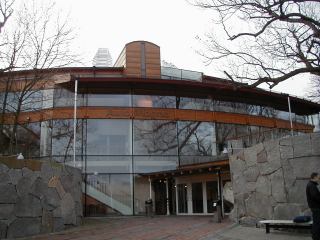
Life in Sweden
No. 17 Dr. Shirakawa's lecture at Stockholm University
2000/12/08
I have been to the lecture by Dr. Hideki Shirakawa who won novel
prize in chemistry this year. The lecture was held at Aula Magna in
Stockholm University. It was open to the public and anyone can listen
to it without a invitation letter. I think this is evidence that
Sweden is an open society.
Aula Magna at Stockholm University.
The interior was beautiful decorated by wood.
Dr. Shirakawa appeared to be a little bit nervous in the beguinning, that was obvious from the tone of his voice. Nevertheless, the lecture was quite comprehensive even to an audience who is not a specialist in that field, and he was explaining his findings using transparancies. According to Japanese newspapers, Dr. Shirakawa thought that this lecture, not the ceremony, was the most important event during his visit to Sweden this time. He told to the newspaper writers that his score was 50 point if the full score is 100 point, and the press commented that he was very strict to himself. I imagine he might have thought that he could have done better.
What I was most interested in was, about the story when they first succeeded in synthesyzing a thin membrane of polyacetylane. In Japan, it was reported that a graduate student, who was doing the experiments together, accidentaly one thousand time of the catalyst, and this incidental finding led to the winning of Nobel prize. This graduate student was from Korea, and I watched a TV interview in which he told that he did not make a mistake, but he was trying various conditions. Thus, there was some argument in Korea why he was not a co-recipient of Nobel prize.
Dr. Shirakawa referred to the story like this way. First, he introduced this Korean student as the person who shared the luck to see the first polyacetylane membrane, when he acknowledged the colleagues in the same laboratory. Then, in terms with the catalyst which was added one thousand time, he told that it is sure that the mili- molar unit was wrongly taken for molar unit, but he do not remember well why it happened. He continued that he might wrongly gave direction to that graduate student, or that student might have wrongly interpretated his direction. He did not reffered whether that student was trying various conditions or not, as that Korean person claimed.
Honestly, I felt something unclear. However, after so long years, it is impossible to figure out the case whether this Korean student voluntarily put one thousand times of the catalyst, or he made a mistake to put one thousand times of catalyst.
In fact, the conflicts between the scientists in regards with the priority of findings are not rare, that is a pitty. However, what I understood well through his lecture was that the Nobel prize was awarded to him not to this incidental finding. The prize was awarded to him for succeeding the development of the conductive plastic, together with two American co-recipients of the prize, by being enough aware of the importance of this incidental finding, and pursuing the real meaning of it.
Chance passes by in front of everybody. Frequently, hose chances may be an important turning point. However, there are only limited people who can grasp the chance, and succeed in developing it. This applies particulary to scientists, but also to any occupation.
For this reason, I could learn various things from Dr. Shirakawa's lecture on this occasion.
The stage arrangements reflected the high profile of Nobel prize.
Dr. Shirakawa looked nervous in the beguninning, but his presentation was very good.
Back
to Index of "Life in
Sweden"
Copyright (C) 2000, Takashi Murata, All rights reserved